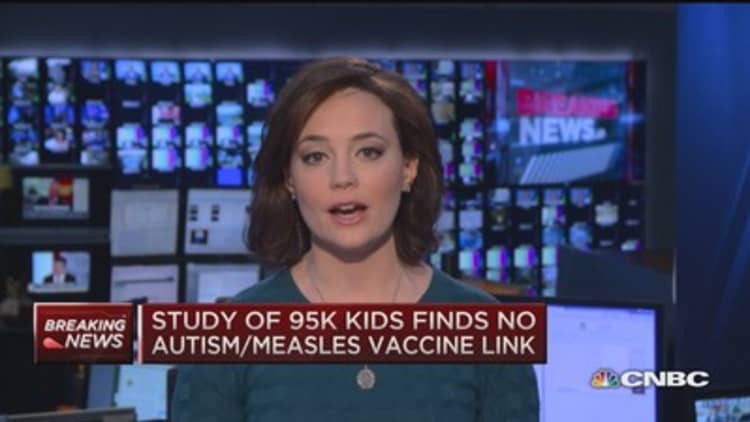
"Controversy seems to follow autism like the tail on a kite," Dr. Bryan King, a researcher at Seattle Children's Autism Center and the University of Washington, wrote in an editorial published Tuesday in the Journal of the American Medical Association.
One that should be put to bed is any connection between autism spectrum disorder and the measles vaccine, according to a separate study published Tuesday in JAMA. It's the latest of at least a dozen studies, according to King, to show no connection.
Researchers examined data on more than 95,000 kids with older siblings, including almost 2,000 with an older sibling with autism spectrum disorder (ASD), to assess risk among those already at higher likelihood of developing autism because of a family connection.
Read MoreWhere we stand on autism
They found "no harmful association between MMR vaccine receipt and ASD even among children already at higher risk for ASD," wrote the study authors, led by Anjali Jain of the Lewin Group, a health-care consulting firm.
The study, funded by the National Institutes of Health and the Department of Health and Human Services, used claims data from a large commercial health plan, the Optum Research Database, part of insurer UnitedHealth. In addition to the Lewin Group, authors came from Optum and Drexel University in Philadelphia.
The publication comes after low immunization rates led to four outbreaks of measles in the U.S. this year, according to the Centers for Disease Control and Prevention, including 117 cases tied to an outbreak stemming from California's Disneyland. Last year saw 668 cases, according to the CDC, the most since measles was declared eliminated in the country in 2000.
Read MoreCase closed on vaccine-autism debate: Doctor
"Although the evidence is already abundant that no relationship exists in the general population between measles, mumps and rubella (MMR) vaccine receipt and autism spectrum disorder (ASD) risk, immunization rates remain low in certain populations and countries because of this inappropriate belief," King wrote in the editorial.
The study illuminated reluctance among some parents to immunize their children if an older sibling has been diagnosed with autism. Research has shown a child has a higher likelihood of developing autism if they have an older sibling with autism spectrum disorder.
In the JAMA study, among kids whose siblings didn't have autism, the MMR vaccination rate was 84 percent at age 2 and 92 percent at age 5. For kids with older siblings with autism, the vaccination rates were lower: 73 percent at age 2, and 86 percent at age 5.
Read MoreObamacare gets more popular
That trend is particularly concerning, not just for exposure of the kids themselves, but because the vaccination rates drop below the 92 percent to 95 percent thought to be required for "herd immunity"—when enough people in a community are vaccinated that even those who can't be immunized due to very young age or medical problems can still be protected.
The concern over a link between the MMR vaccine and measles dates to a since-retracted study published in the Lancet in 1998, reporting on just 12 kids.
Tuesday's JAMA study, of more than 95,000 kids, and 994 with autism, builds on several previous studies showing no link between autism spectrum disorder and the MMR vaccine.
"The only conclusion that can be drawn from the study is that there is no signal to suggest a relationship between MMR and the development of autism in children with or without a sibling who has autism," King wrote in the accompanying editorial. "Taken together, some dozen studies have now shown that the age of onset of ASD does not differ between vaccinated and unvaccinated children, the severity of course of ASD does not differ between vaccinated and unvaccinated children, and now the risk of ASD recurrence in families does not differ between vaccinated and unvaccinated children."

